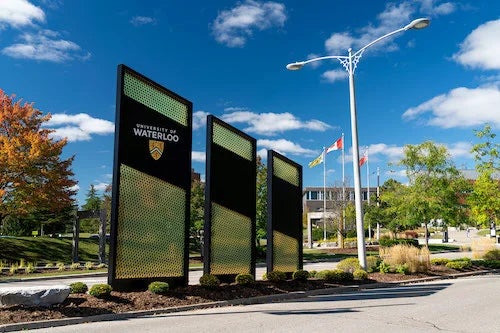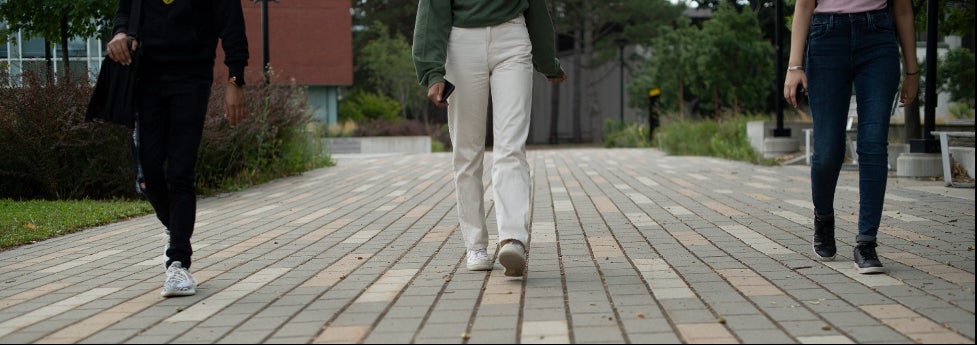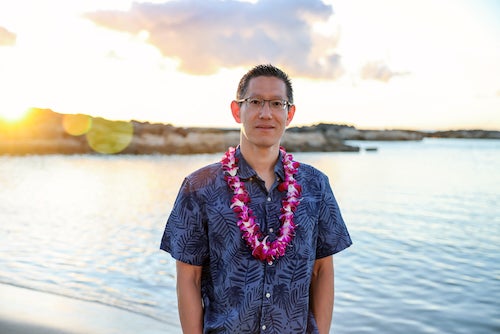Editor:
Brandon Sweet
University Communications
bulletin@uwaterloo.ca
Waterloo marks 15 straight years as top research university

By Angelica Sanchez.
The University of Waterloo has been designated Research University of the Year among Canadian comprehensive universities by Research Infosource Inc. for the 15th consecutive year.
Waterloo’s President and Vice-Chancellor, Vivek Goel, says the University’s research excellence stems from its continued focus on empowering its students, faculty, and community to seek out solutions to the world’s most pressing challenges.
“As an institution, we’re committed to being bold and creative in our teaching and research to ensure a stronger and healthier tomorrow,” Goel says. “Waterloo researchers excel in fundamental and applied research conducted in a unique environment that integrates experiential education and entrepreneurship. Our research advances society with impact across the economy, advancing the use of emerging critical technologies with application in areas such as sustainability and health with local and global impact.”
Waterloo’s consistent ranking as Canada’s most comprehensive research university is a testament to the University’s strategic priority to strengthen global connections and advance research for sustainable solutions in our evolving world.
Waterloo also ranked first for research income and corporate research income among Canada’s Top 50 Research Universities in the comprehensive category and second for not-for-profit research income in the same category.
“We are delighted that Research Infosource has once again recognized Waterloo’s research excellence among Canadian comprehensive universities,” says Charmaine Dean, vice-president of Research and International at Waterloo. “It is a true reflection of the dedication of Waterloo researchers and their pursuit of global change to build a more sustainable future for humanity.”
Research Infosource’s Canada’s Top 50 Research Universities rankings are based on a balanced set of impact measures that distinguishes exceptional achievement in research income and publishing research in leading scientific journals.
Supporting students through the challenging housing market

A message from the UWaterloo Life team.
Students continue to face challenges securing off-campus student housing and for many, renting for the first time can be confusing and overwhelming.
Recognizing these challenges, partners across the University came together, including Campus Housing, The Centre, Waterloo Undergraduate Student Association (WUSA), Graduate Studies and Postdoctoral Affairs, University Relations and the UWaterloo Life team, to share resources and supports to help them navigate the process. This includes a newly designed website and communications plan, so the information is readily available for students.
An important part of the development process was asking students what tools and resources would be helpful to them. The group conducted consultation groups with both undergraduate and graduate students through the UWaterloo Life team to help inform the content. Through the consultations, we learned the main pain points students are experiencing when searching for off-campus housing, the types of resources and tools that would be helpful and at what time of year they would be needed. Understanding how they would like to consume the information and where they would expect to find it were important takeaways.
Our students also shared with us that one of the important factors to successfully navigating the housing market was to start the search early which is why the website relaunched this week and will be supported with messaging across a variety of social media channels and digital screens on campus. Ensuring students have quick and easy access to information, regardless of where they are in their journey, to find housing was important for the group. The online space offers tips, resources and tools aligned with their requested needs to ensure they are set up for success in an easy to navigate step-by-step process.
Step 1: Explore: Start looking for a place:
Students can leverage the contract the University has with Places4Students to browse available housing options in a secure space.
Step 2: What to know: Before you rent:
Planning for an off-campus housing experience is also important. Students need to consider things like finding roommates and managing the different components of a rental agreement like whether utilities are included and much more.
Step 3: When you’re ready: Signing a lease
A lease is a binding contract and needs careful consideration. This portion of the website provides guidance to students to better understand the purpose of a lease, how to negotiate with the landlord and steps to take to terminate a lease.
In addition to the steps above, students can also find resources to support their rights as a tenant and answers to frequently asked questions regarding their lease agreement or challenges they are facing with their landlord.
It’s important to ensure our students feel supported through help at Waterloo as they navigate the housing market. That support extends beyond the typical search for housing and into advocacy within the Region of Waterloo where the University is a key member of the Waterloo Town and Gown Committee along with representative from the Waterloo Undergraduate Student Association (WUSA) and the Graduate Student Association (GSA). There are also a variety of programs in place to support students facing economic hardships or emergencies leading to a need for urgent short-term housing options.
How can you help? Ensure this resource is shared with our campus community.
For questions or comments about this initiative, connect with Jenn Willoughby, Director, Student Life Communications, UWaterloo Life team or Heather Lang, Manager, Marketing and Communications, Campus Housing.
Jimmy Lin named a 2022 ACM Fellow

Professor Jimmy Lin has been named a 2022 ACM Fellow for his contributions to question answering, information retrieval, and natural language processing. When he’s not working on these things, Professor Lin enjoys travelling with his family — here he is on a recent vacation in Hawaii.
A message from the Cheriton School of Computer Science.
Professor Jimmy Lin has been named a 2022 ACM Fellow for his contributions to question answering, information retrieval, and natural language processing.
The Association for Computing Machinery is the world’s largest educational and scientific computing society, uniting computing educators, researchers and professionals to inspire dialogue, share resources and address the field’s challenges. ACM fellowships are conferred to the top 1 percent of the association’s members, and the prestigious recognition indicates outstanding accomplishments in computing and information technology and outstanding service to ACM and the larger computing community.
This year the Association for Computing Machinery named 57 members as ACM Fellows for wide-ranging and fundamental contributions in disciplines including cybersecurity, human-computer interaction, mobile computing, and recommender systems among many other areas. Fellows are nominated by their peers, with nominations reviewed by a distinguished selection committee.
Professor Lin has been working for a quarter century on the challenge of connecting users with relevant information, at the intersection of natural language processing and information retrieval. He explains, “In the mid-1990s, I learned about question answering systems, which were these seemingly magical interfaces that could directly answer questions like ‘How far is the Earth from the sun?’ posed in natural language.”
“Today, with intelligent agents such as Siri and Alexa, this is no big deal, of course.” Professor Lin went on, “But back then, web search was barely a thing, and yet these systems were already attempting to go beyond simply returning a bunch of links that you then had to sort through.”
More broadly, information access is a fundamental human right, Professor Lin notes. The Universal Declaration of Human Rights by the United Nations articulates that everyone has the right “to seek, receive and impart information and ideas through any media and regardless of frontiers.” Professor Lin has devoted his career to developing technological capabilities, including search and question answering systems, to promote these ideals.
After receiving his PhD at the Massachusetts Institute of Technology in 2004, Professor Lin started his first faculty position at the University of Maryland, College Park, in the United States. He spent a decade there before joining the Cheriton School of Computer Science as a Professor and a David R. Cheriton Chair in 2015. His arrival at Waterloo was the catalyst for the formation of the Data Systems Group, an assemblage of computer science researchers who collaboratively tackle all phases of the information lifecycle, from ingesting, cleaning, and curation to inference, insight generation, and decision support.
“We are proud of Jimmy’s accomplishments and this well-deserved recognition,” said Raouf Boutaba, Professor and Director of the Cheriton School of Computer Science. “This honour affirms Waterloo’s standing among the top computer science institutions in the world for both research and education.”
Adds Mark Giesbrecht, Professor and Dean of the Faculty of Mathematics, “Bringing Professor Lin to Waterloo has not only bolstered the research excellence of the university, but also adds depth to the tremendous talent in artificial intelligence here in Canada, particularly in natural language processing and data science.”
Professor Lin believes that to achieve impact, research needs to be deployed in real-world applications that benefit users. Over the years, he’s worked on systems specifically designed for diverse populations, ranging from causal searchers on the web to medical doctors, historians, and data scientists.
Early in his academic career, Professor Lin spent time at the US National Library of Medicine (NLM), part of the US National Institutes of Health (NIH), working on information access techniques for the biomedical literature. During an extended sabbatical at Twitter over a decade ago, he helped architect and build what we would today call a “data lake” and a data science platform on top. He also worked on Twitter search and recommendation systems during that time, including the popular “who to follow” service. A few years ago, he contributed to voice understanding models that powered the Xfinity X1 entertainment platform by Comcast, the US telecommunications conglomerate, which gave consumers the ability to control their TVs using voice remotes.
More recently, he served as the Chief Scientist of RSVP.ai, a Waterloo-based startup that aims to build deep natural language understanding technologies to facilitate seamless dialogues between users and systems. Currently, he is the CTO of Primal, another Waterloo-based company that aims to help organizations unlock actionable insights from their information stores by combining capabilities based on semantic knowledge graphs and deep learning.
Professor Lin credits the numerous students, collaborators, and colleagues that have accompanied him on this intellectual journey over the years. “This recognition would not have been possible without them,” he acknowledges, “as well as numerous mentors who have guided me along the way.”
In 2021, Professor Lin was appointed the co-director of the Waterloo Artificial Intelligence Institute, which aims to promote cross-disciplinary research at the frontiers of artificial intelligence and its applications across all faculties at the University of Waterloo. The Institute’s emphasis on both foundational advances as well as their applications to tackle real-world challenges aligns perfectly with his approach to research.
Of late, Professor Lin is working on multilingual information access, focusing on low-resource languages that have received little attention from researchers, and multimodal information access, enabling search across both text and images. Opining about the future, Professor Lin says, “There’s no doubt that AI will have transformative impact on information access, especially with the advent of large language models such as ChatGPT. These technologies demonstrate incredible potential, but their tendency to hallucinate plausible sounding but wrong information is a serious concern. There’s definitely enough to keep me busy for many more years to come!”
Waterloo esports gets power-up with new scholarship

By Emma Vossen. This article was originally published on Waterloo News.
The University of Waterloo Games Institute has secured $25,000 of funding per year over two years from the Ontario government to provide scholarships to students pursuing careers in the gaming and esports industries.
The Games Institute is an interdisciplinary research network hub that seeks to advance the study, design and purpose of interactive, immersive technologies and experiences. It is a key part of the Waterloo tech ecosystem for its role in research, education, knowledge dissemination, outreach and collaboration.
The new scholarship is an interdisciplinary collaborative effort between the Games Institute and the faculties of Arts, Health, Math, Engineering and Science, part of an Ontario-wide allocation of one million dollars over two years across 18 institutions.
The scholarships are valued at $2,500 to $5000 each and will support high-achieving graduate and undergraduate students who demonstrate financial need and are pursuing careers in the gaming and esports industries.
“Given the continual growth of the esports phenomenon worldwide, it's fantastic to see the Ontario government supporting students who want to be part of this emerging profession through these scholarships,” says Neil Randall, executive director of the Games Institute. “UWaterloo students are perfect for this initiative, and I'm excited about where the support will lead them.”
Successful applicants will be welcomed to join Waterloo's Games Institute as members of the community and research ecosystem to help further and support their work in gaming, esports and interactive technologies.
The new scholarship opportunity comes on the heels of remarkable growth and recent successes of esports at Waterloo. In November 2022, an esports event hosted at the local Bingemans Conference Centre attracted participants from around the region. Waterloo's competitive esports team is actively involved in competition with other Ontario universities and in tournaments throughout North America. Esports continues to be one of the fastest-growing sectors in the entertainment industry.
Interested students are invited to apply for the new scholarships.
Link of the day
When and Where to get support
Students can visit the Student Success Office online for supports including academic development, international student resources, immigration consulting, leadership development, exchange and study abroad, and opportunities to get involved.
Instructors looking for targeted support for developing online components for blended learning courses, transitioning remote to fully online courses, revising current online courses, and more please visit Agile Development | Centre for Extended Learning | University of Waterloo (uwaterloo.ca).
Faculty, staff, post-doc and graduate student instructors can find upcoming teaching and learning workshops, self-directed modules and recordings of previous events on Centre for Teaching Excellence Workshops and Events page.
Instructors can access the EdTech Hub to find support on Waterloo’s centrally supported EdTech tools. The Hub is supported by members of IST’s Instructional Technologies and Media Services, Centre for Teaching Excellence, Centre for Extended Learning and subject matter experts from other campus areas.
Supports are available for employees returning to campus. Visit IST’s Hybrid Work and Technology guidelines and workplace protocols to assist with the transition.
Students with permanent, temporary and suspected disabilities and disabling conditions (medical conditions, injuries, or trauma from discrimination, violence, or oppression) can register with AccessAbility Services for academic accommodations (classroom accommodations, testing accommodations, milestone accommodations).
Instructors can visit AccessAbility Services' Faculty and Staff web page for information about the Instructor/Faculty role in the accommodation process. Instructors/Faculty members are legally required to accommodate students with disabilities. AccessAbility Services (AAS) is here to help you understand your obligations, and to offer services and resources to help you facilitate accommodations.
The Writing and Communication Centre has in-person and virtual services to support grad and undergrad students, postdocs and faculty with any writing or communication project. Services include one-to-one appointments, drop-ins at Dana Porter Library, online workshops, writing groups, English conversation practice, and custom in-class workshops.
Research Ethics: Find yourself with an ethical question, unsure if your work requires an ethics review, or need advice about putting together a research ethics application? Reach out to one of our friendly staff by booking a consultation or email us with your questions.
Co-op students can get help finding a job and find supports to successfully work remotely, develop new skills, access wellness and career information, and contact a co-op or career advisor.
The Centre for Career Action (CCA) has services and programs to support undergrads, grad students, postdocs, alumni, and employees in figuring out what they value, what they’re good at, and how to access meaningful work, co-op, volunteer, or graduate/professional school opportunities. Questions about CCA's services? Live chat, call 519-888-4047, or stop by our front desk in the Tatham Centre 8:30 a.m. to 4:30 p.m., Monday to Friday.
Drop-in to in-person Warrior Study Halls on Thursdays from 5:00 p.m. to 6:30 p.m. in DC and DP. Join a Peer Success Coach to set goals and work independently or in groups each week.
Renison's English Language Institute continues to offer virtual events and workshops to help students practice their English language skills.
If you feel overwhelmed or anxious and need to talk to somebody, please contact the University’s Campus Wellness services, either Health Services or Counselling Services. You can also contact the University's Centre for Mental Health Research and Treatment. Good2Talk is a post-secondary student helpline available to all students.
The Library is here to help, both in person and online. Our spaces are open for access to book stacks, study space, computers and printers, and the IST Help Desk. For in-depth support, meet one-to-one with Librarians, Special Collections & Archives and Geospatial Centre staff. Access our resources online for anywhere, anytime learning and research. Full details on current services and hours are available on the Library’s COVID-19 Update webpage.
The Faculty Association of the University of Waterloo (FAUW) continues to advocate for its members. Check out the FAUW blog for more information.
The University of Waterloo Staff Association (UWSA) continues to advocate for its members. Check out the UWSA blog for more information.
The Office of Equity, Diversity, Inclusion & Anti-Racism (EDI-R) works with students, faculty and staff across campus to advance equity and Anti-racism through evidence-based policies, practices and programs. If you have a concern related to Anti-racism and/or equity, please complete our intake form.
The Sexual Violence Prevention and Response Office (SVPRO) supports all members of the University of Waterloo campus community who have experienced, or been impacted, by sexual violence. This includes all students, staff, faculty and visitors on the main campus, the satellite campuses, and at the affiliated and federated Waterloo Institutes and Colleges. For support, email: svpro@uwaterloo.ca or visit the SVPRO website.
The Office of Indigenous Relations is a central hub that provides guidance, support, and resources to all Indigenous and non-Indigenous campus community members and oversees the University's Indigenization strategy.
The Waterloo Indigenous Student Centre, based at United College, provides support and resources for Indigenous students, and educational outreach programs for the broader community, including lectures, and events.
WUSA supports for students:
Peer support - MATES, Glow Centre, RAISE, Women’s Centre - Click on one of the links to book an appointment either in person or online for the term.
Food Support Service food hampers are currently available from the Turnkey Desk 24/7 in the Student Life Centre. Drop-off locations are also open again in SLC, DC, DP, SCH, and all residences.
Co-op Connection all available online.
Centre for Academic Policy Support - CAPS is here to assist Waterloo undergraduates throughout their experience in navigating academic policy in the instances of filing petitions, grievances and appeals. Please contact them at caps@wusa.ca.
WUSA Student Legal Protection Program - Seeking legal counsel can be intimidating, especially if it’s your first time facing a legal issue. The legal assistance helpline provides quick access to legal advice in any area of law, including criminal. Just call 1-833-202-4571.
Empower Me is a confidential mental health and wellness service that connects students with qualified counsellors 24/7. They can be reached at 1-833-628-5589.
GSA-UW supports for graduate students:
The Graduate Student Association (GSA-UW) supports students’ academic and social experience and promotes their well-being.
Advising and Support - The GSA advises graduate students experiencing challenges and can help with navigating university policies & filing a grievance, appeal, or petition.
Mental Health covered by the Health Plan - The GSA Health Plan now has an 80 per cent coverage rate (up to $800/year) for Mental Health Practitioners. Your plan includes coverage for psychologists, registered social workers, psychotherapists, and clinical counselors.
Dental Care - The GSA Dental Plan covers 60 to 70 per cent of your dental costs and by visiting dental professionals who are members of the Studentcare Networks, you can receive an additional 20 to 30 per cent coverage.
Student Legal Protection Program - Your GSA fees give you access to unlimited legal advice, accessible via a toll-free helpline: +1-833-202-4571. This advice covers topics including housing disputes, employment disputes, and disputes with an academic institution.
The Graduate House: Open Monday to Tuesday 11:30 a.m. to 7:00 p.m. and Wednesday to Friday 11:30 a.m. to 9:00 p.m. We’re open to all students, faculty, staff, and community members. The Graduate House is a community space run by the GSA-UW. We’re adding new items to the menu. Graduate students who paid their fees can get discounts and free coffee.
When and Where
Warriors Game Day Tickets and Season Passes, on sale now. Cheer on your Warriors W/M Basketball, Football W/M Hockey and W/M Volleyball teams at home during the 2022-23 season. Purchase today.
Fitness and Personal Training - Registrations opened January 5 this winter with Personal Training and Small Group Training as well as a Free Warrior Workout Program.
NEW - What's Your Problem with Larry Smith, Thursday, January 19, 5:00 p.m. to 6:30 p.m., SCH cafeteria.
Knowledge Integration seminar: “Future Cities”, featuring speaker Marta Berbés-Blázquez, Caivan Communities Assistant Professor, School of Planning and the Faculty of Environment, Friday, January 20, 2:30 p.m., EV3-1408.
NEW - Canadian Graduate Quantum Conference, Tuesday, January 24, Mike & Ophelia Lazaridis Quantum-Nano Centre
Research Talks, “The AI Tsunami – Where will it take us?” Tuesday, January 24, 6:00 p.m. to 8:00 p.m., Jobsite Brewing Co., 45 Cambria Street, Stratford, Ontario. Registration is required as seating is limited.
NEW - Noon Hour Concert: The Virtuosic Violin, Bach, Waxman & More, Wednesday, January 25, 12:30 p.m. to 1:30 p.m., Conrad Grebel Chapel.
Deadline to register for Centre for Extended Learning (CEL) "Getting Ready to Facilitate Online Courses: TA Training – Winter 2023" course, Monday, January 30.
NEW - 2SLGBTQ+ Fundamentals, Tuesday, January 31, 10:00 a.m. to 12 noon, online.
Additional position available
Human Resources is advertising the following position, viewable on the UWaterloo Talent Acquisition System (iCIMS):
- Job ID# 9745 – Administrative Officer, School of Accounting and Finance, USG 13
This is a regular full-time role.